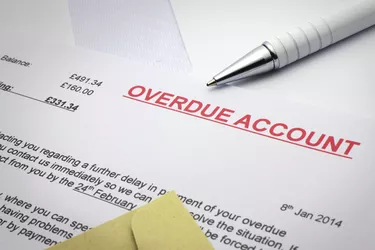
Two different scenarios occur that lead to payday loan harassment. You might have taken out a payday loan, not repaid it, and now collectors are harassing you; or you may have never touched a payday loan, but scam artists claiming to be payday loan companies are harassing you. For either situation, you can take steps to deal with the harassment.
Examples of Illegal Communication for Legitimate Debt
Video of the Day
Even if you owe money to a payday loan company, the company and any associated debt collectors are limited by the Fair Debt Collection Practices Act in how they can call you. A debt collector isn't legally allowed to repeatedly call and harass you. He can't arbitrarily inflate your debt or threaten to do so, with the exception of the interest that you agreed to owe. He can't threaten to put you in jail, and he can't call before 8 a.m. or after 9 p.m. He also can't call you at work if you've asked him not to do so.
Video of the Day
Stopping the Phone Calls
If you're getting annoying phone calls about a payday loan debt that you owe, you can send a cease-communication letter to the payday loan company or its debt collection company, and the calls have to stop. The letter can say something simple like, "Don't call me at work or home. Please send a letter if you need to contact me." The Consumer Financial Protection Bureau has sample letters online that you can use to model your letter. If the payday loan company ignores your letter or if it breaks any other FDCPA debt collection rules, report these actions to the Federal Trade Commission, the CFPB and your local state attorney general.
Dealing With Calls From Suspected Scammers
If you suspect a payday loan call is a scam, ask for written verification of your debt. The FDCPA requires loan companies and debt collectors to put this information in writing. In addition, you can ask for the payday company's phone number and the name of a manager. Look up the information online to verify if the caller is legitimate. Many websites list phone numbers from known scammers. Don't give out any personal information, such as your name and address. The caller may be pretending to represent a payday loan company but is really fishing for information.
Don't Be Intimidated by Threats
Payday loan collectors aren't legally allowed to threaten you. If a caller threatens a lawsuit, ask for the case number and the name of the court where the suit's been filed. If the caller claims to work with law enforcement, ask for his name and the name of the agency or police department where he works. Inform the caller that you'll be contacting that police department to confirm his identity. More than likely, the caller won't be able to give you this information, and he'll be outed as a scammer.